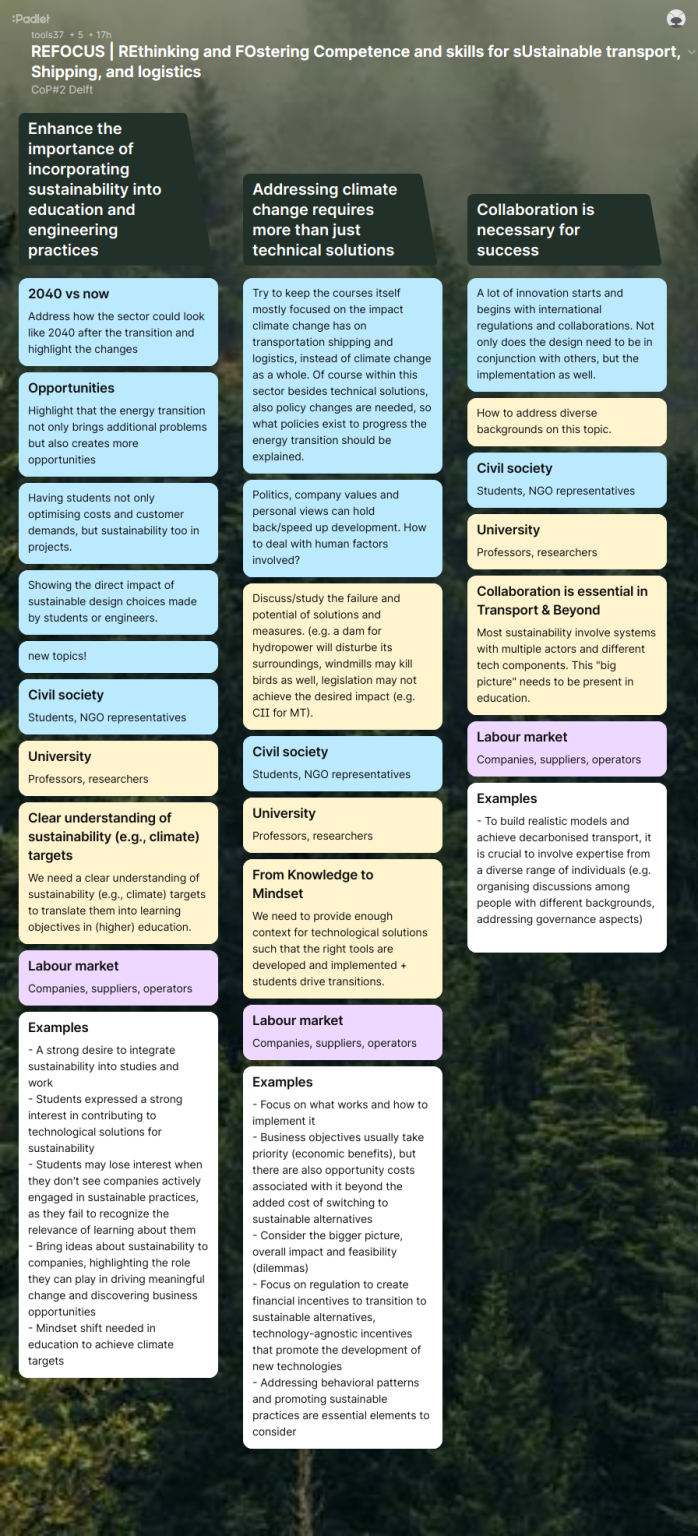Communities of Practice: The Netherlands
Thematic units of future-oriented curricula
Opportunities of the energy transition leading to higher sustainability
Impacts assessment and balance of functionality, efficiency, effectiveness
Policy and legal framework
Climate change and concept of sustainability, with an interdisciplinary approach

- Students aspire to learn and apply sustainability in engineering studies, aiming to analyze environmental and climate change impacts in their future careers. Advocating for sustainable solutions, students can drive positive change in workplaces, even without active demands from companies.
- Ethical aspects, safety, and societal well-being are deemed crucial in both engineering and sustainability studies.
- Regulation and financial incentives serve as key drivers for sustainability, creating motivations for increased investment in eco-friendly technologies within companies.
- Multi-stakeholder collaboration is vital for addressing sustainability challenges through the sharing of knowledge and perspectives, fostering innovative solutions.
- Promoting behavioral changes and adapting consumption patterns alongside technological progress is essential for achieving sustainability goals.
- The Netherlands’ unique coastal position requires sustainable practices in the maritime industry for maintaining a leading position.
- The significance of further integrating sustainability into engineering education and practices is emphasized, acknowledging challenges in transitioning towards sustainable solutions. Awareness about the broader context of climate change should be instilled in students, and collaboration in engineering is encouraged, recognizing diverse perspectives, interdisciplinary involvement, and global inclusivity as vital for fostering innovation and creating inclusive designs.
Not all technological innovations are justified, a holistic approach is needed
Both technological knowledge and mindset changing are needed, whereby the latter will most likely be done best through pricing and awareness creation.
All technological innovations should be justified, as long as they have a positive social cost-benefit, which means they include social and environmental costs also, next to economics.

Addressing climate change requires more than just technical solutions
Try to keep the courses itself mostly focused on the impact climate change has on transportation shipping and logistics, instead of climate change as a whole. Of course within this sector besides technical solutions, also policy changes are needed, so what policies exist to progress the energy transition should be explained.
The TU Delft attaches great value to openness. We are the front runner in the field of open education and science. TU Delft stimulates multidisciplinary team work between colleagues of different scientific disciplines and different university services. The TU Delft also intensively collaborates with other universities (e.g. Erasmus University Rotterdam and the University of Leiden) in the field of education and science. We work in diverse collaboration in the Netherlands, Europe and globally. Our scientists also collaborate widely with businesses and societal organisations.
The Department of Maritime and Transport Technology of the TU Delft has been involved in a long list of EU and National funded projects on the sustainability of shipping. Some recent and active projects are MAGPIE, READINESS, NOVIMOVE, NOVIMAR, NAVAIS, ISHY, SH2IPDRIVE, MENENS, AmmoniaDrive, AVATAR, Green Ship Recycling and TODDIS. Several of these projects also contain the development of learning activities (e.g. TODDIS is linked to the set-up of Minor on the same subject, NAVAIS and MAGPIE lead to specific module development). Furthermore TU Delft and especially the department is member of Resilient Delta, 4TU, LDE, TRANSPORTNet and WEGEMT, which are all cooperations with national and international partner universities with a focus on education.
